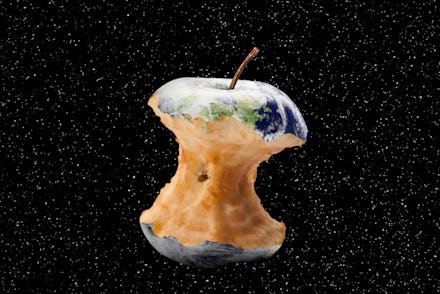This new fake sugar is made from food waste — but is it good for us?

You know the old saying that one person’s trash is another’s treasure? Well, a new Dutch company is turning that adage around in a sweetly innovative way. Fooditive, a company founded by food scientist Moayad Abushokhedim, is turning food waste into a sweetener that is meant to be healthier for us and the planet. Fooditive’s sweetener uses 3rd grade apples (the ones not fit to be sold at Whole Paycheck) and other food scraps, extracts the natural fructose through a fermentation process, and makes all that into a zero calorie natural sweetener, Fast Company recently reported.
This sounds, to me, like some next-level thinking. Fooditive is taking the excess produce we grow but won’t eat and feeding it back to us in the form of sweetness? Genius. And much needed, because the earth is an increasingly malfunctioning space heater and our current alternatives to sugar are all problematic.
Chemical sweeteners are notoriously gross-tasting, and as you have probably heard, at least one of them is linked to cancer in lab rats. Scientists aren’t sure, yet, what effects chemical sweeteners may have on the human body, but some of them may pose a risk to the environment — which is ironic since this particular product aims at eco-consciousness. One type of artificial sweetener, Sucralose, isn’t completely absorbed by our bodies when we consume products with it, so it ends up coming out in our bodily waste; water treatment facilities can’t completely remove the chemicals in it, so they end up in streams and rivers.
Sugar is controversial, stevia is bitter, and even honey has come under fire from scientists for displacing wild species of bees. So, then, what’s someone with a sweet tooth and a conscience to do? Could Fooditive’s new sweetener remedy a pattern of faulty sub-ins? Only time will tell, according to experts.
Fooditive's mission is to "develop food additives that contribute to a healthier body and a healthier environment,” and the company is dedicated to sustainability, Abushokhedim said in a press release. The company also makes thickeners from banana skins to make your sauces less runny, sustainable preservatives, and baked goods out of carrot waste. Fooditive products available now in the Netherlands, but so far have not been approved for sale in the UK or the US.
While “healthy” can be defined differently depending on the content, I wondered how Fooditive’s sweetener will measure up compared to others. “I'm skeptical because there is no mention of what the Fooditive molecule is made of,” says Jessica Blanchard, a New Orleans-based holistic nutritionist and dietician, after researching Fooditive’s publicly available specs.
“Depending on what fooditive is made of, it can kick off different metabolic pathways. It still must be processed by the digestive system and ultimately the liver.” Until we can explore molecular science behind Fooditive, Blanchard points out, it isn’t evident what it does in the body on a cellular level or in the long term.
So while Fooditive’s approach to upcycling food waste can give us hope, we’re best off with approaching it with hopeful curiosity rather than blind excitement.
“While it looks like a great product from a sustainability perspective, it needs to be tested to see how it impacts biomarkers like glucose, insulin, and uric acid,” Blanchard says. “Zero calorie does not equal zero impact on the body's nutritional biochemistry.” Fooditive looks really good from an environmental perspective, which is nothing to sneeze at, but it will take more research to figure out whether it’s good for our bodies or not.